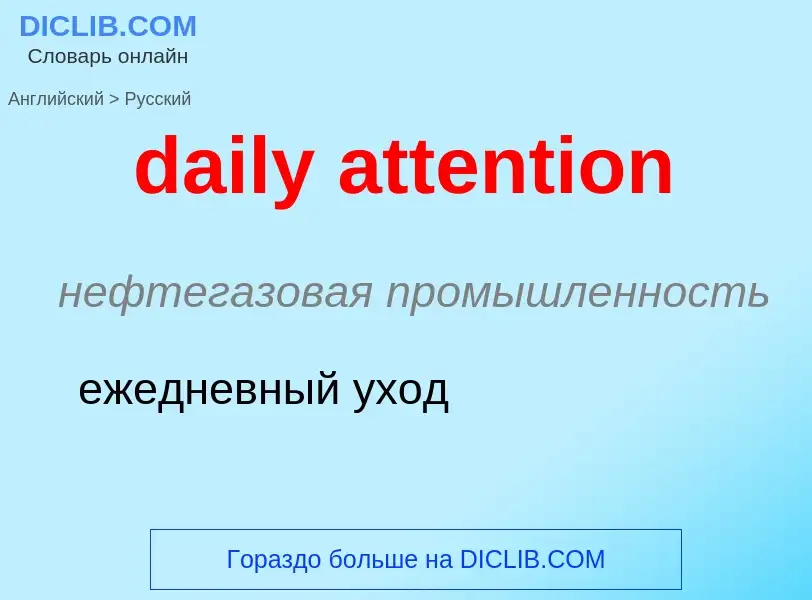Перевод и анализ слов искусственным интеллектом ChatGPT
На этой странице Вы можете получить подробный анализ слова или словосочетания, произведенный с помощью лучшей на сегодняшний день технологии искусственного интеллекта:
- как употребляется слово
- частота употребления
- используется оно чаще в устной или письменной речи
- варианты перевода слова
- примеры употребления (несколько фраз с переводом)
- этимология
daily attention - перевод на русский
нефтегазовая промышленность
ежедневный уход
[,deɪlɪ'meɪl]
общая лексика
"Дейли мейл" (ежедневная газета консервативного направления; тир. ок. 1,6 млн. экз.; принадлежит концерну "Ассошиэйтед ньюспейперз" [Associated Newspapers]. Основана в 1896; с 1917 малоформатная газета [tabloid])
[haipəræk'tiviti]
общая лексика
повышенная активность
гиперфункция
медицина
гиперактивность
повышенная деятельность (больного)
существительное
физиология
сверхактивность
общая лексика
гиперкинез
[,deɪlɪ'wə:kə]
общая лексика
"Дейли уоркер" (ежедневная газета; орган Коммунистической партии Великобритании [Communist Party of Great Britain]. Выходила с 1930 по 1966)
синоним
[,deɪlɪ'græfɪk]
общая лексика
"Дейли график" (ежедневная газета консервативного направления. Издавалась с 1890; в 1926 слилась с "Дейли скетч" [Daily Sketch])
Определение
Википедия

Attention economics is an approach to the management of information that treats human attention as a scarce commodity and applies economic theory to solve various information management problems. According to Matthew Crawford, "Attention is a resource—a person has only so much of it."
In this perspective, Thomas H. Davenport and John C. Beck define the concept of attention:
Attention is focused mental engagement on a particular item of information. Items come into our awareness, we attend to a particular item, and then we decide whether to act.
As content has grown increasingly abundant and immediately available, attention becomes the limiting factor in the consumption of information. A strong trigger of this effect is that it limits the mental capability of humans and the receptiveness of information is also limited. Attention allows information to be filtered such that the most important information can be extracted from the environment while irrelevant details can be left out.
Software applications either explicitly or implicitly take attention economy into consideration in their user interface design based on the realization that if it takes the user too long to locate something, they will find it through another application. This is done, for instance, by creating filters to make sure viewers are presented with information that is most relevant, of interest, and personalized based on past web search history.


![in Japan]], involuntarily occupy the attention of those who hear them, an example of [[attention theft]]. in Japan]], involuntarily occupy the attention of those who hear them, an example of [[attention theft]].](https://commons.wikimedia.org/wiki/Special:FilePath/Nissan Caravan sound truck of JCP in Okazaki, Aichi 20090520.jpg?width=200)
![Advertisement by the ''Daily Mail'' for insurance against [[Zeppelin]] attacks during the [[First World War]] Advertisement by the ''Daily Mail'' for insurance against [[Zeppelin]] attacks during the [[First World War]]](https://commons.wikimedia.org/wiki/Special:FilePath/Daily Mail Zeppelin Fund WWI.jpg?width=200)





![[[May Day]] parade float with statue reading the ''Daily Worker'' [[May Day]] parade float with statue reading the ''Daily Worker''](https://commons.wikimedia.org/wiki/Special:FilePath/May Day parade float with male statue reading the “Daily Worker”.jpg?width=200)


.png?width=200)




![[[Ezekiel Stone Wiggins]] prophesy - Jan 17 1883 by [[Grant E. Hamilton]] [[Ezekiel Stone Wiggins]] prophesy - Jan 17 1883 by [[Grant E. Hamilton]]](https://commons.wikimedia.org/wiki/Special:FilePath/New York Daily Graphic Ezekiel Stone Wiggins Jan 17 1883 by Grant Hamilton.jpg?width=200)
